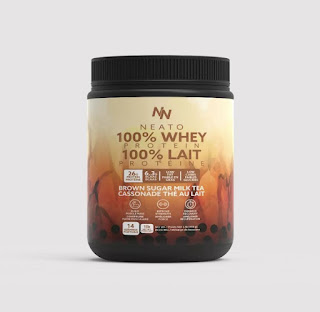"Boba Tea Protein: A Sip Towards Health and Muscle"
Boba tea, with its chewy tapioca pearls and sweet, milky tea, has been a cultural phenomenon. Today, this delightful beverage is merging with health trends to offer more than just taste: enter Boba Tea Protein. This unique beverage fusion brings together the whimsy of boba and the solid benefits of protein, providing a delicious twist on traditional health drinks.
Boba Tea Protein is the fitness enthusiast's sweet indulgence and the health-conscious individual's dessert in a cup. As the world becomes more health-focused, this drink meets the demand for products that combine nutrition with pleasure. It's the answer for those who want the joy of boba without sidelining their fitness goals.
The Origin of Boba
The story of boba tea begins in Taiwan during the 1980s, and its journey to international acclaim is nothing short of extraordinary. Originally a simple combination of tea, milk, sweeteners, and tapioca pearls, boba tea captured the hearts of millions with its unique texture and taste. It's this universal appeal that makes boba tea the perfect canvas for a protein-packed makeover.
Health Meets Taste
In a regular boba tea, nutritional value may take a backseat to flavor. However, Boba Tea Protein redefines the narrative by infusing high-quality protein into the mix, making it a viable option for muscle recovery and growth. This new twist provides the satisfaction of a sweet treat, with the added benefit of supporting a balanced diet.
Types of Protein Used
Catering to a variety of dietary needs and preferences, Boba Tea Protein incorporates different types of protein. Whey protein is a favorite for its fast absorption, ideal for post-workout recovery. Plant-based proteins like soy, pea, and rice are excellent alternatives for those following vegan lifestyles or with specific dietary restrictions. Each protein type offers distinct health benefits and allows the drink to cater to a broader audience.
How to Make Boba Tea Protein at Home
Making Boba Tea Protein at home is an enjoyable and simple process. Begin with the boba pearls, cooking them until they achieve their signature chewiness. Simultaneously, choose a protein powder that complements the flavor profile of your tea. Mix the protein into a brewed tea of choice, stir in your choice of milk, and combine with the pearls. The result is a homemade, refreshing beverage that packs a protein punch.
Popular Flavors and Variations
The versatility of Boba Tea Protein means that it can be customized to suit any palate. Classic flavors like chocolate and vanilla are perennial favorites, while more adventurous drinkers might opt for matcha, taro, or fruit-infused teas. Each flavor offers a different set of antioxidants and health benefits, making Boba Tea Protein not only tasty but also beneficial.
Nutritional Information
On average, a serving of Boba Tea Protein contains between 15-25 grams of protein, but this can vary based on the ingredients and proportions used. While the tapioca pearls contribute carbohydrates, opting for healthier sweetener options and low-fat milk can help maintain the drink's nutritional balance.
Lifestyle Integration
Boba Tea Protein fits effortlessly into any lifestyle. It's a perfect post-workout beverage for fitness enthusiasts, a suitable meal replacement for those on the go, and a fun way to increase protein intake for vegetarians and others focusing on muscle-building diets. The ability to customize the protein source makes it inclusive for almost any dietary plan.
Conclusion
Boba Tea Protein represents a culinary innovation in the world of health beverages. It brings together the best of both worlds: the fun and flavor of traditional boba tea with the functional benefits of protein. As the trend continues to grow, Boba Tea Protein stands out as a frontrunner in the race to provide healthful, protein-rich, and enjoyable drink options. It's not just a fad; it's a delicious movement towards better health, one sip at a time.




Comments
Post a Comment